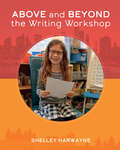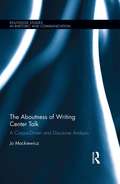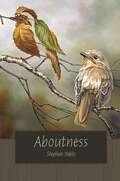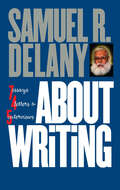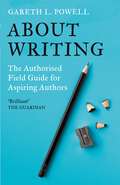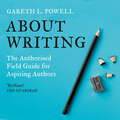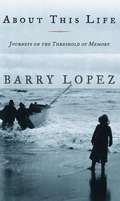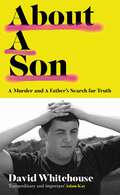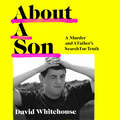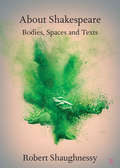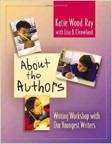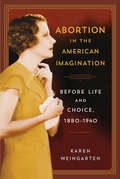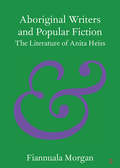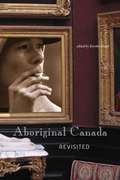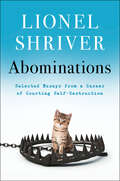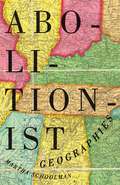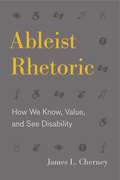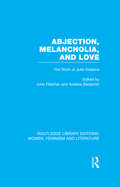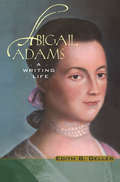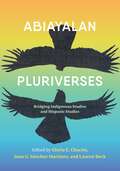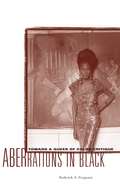- Table View
- List View
Above and Beyond the Writing Workshop
by Shelley HarwayneWhen writing workshops first blossomed in classrooms, its hallmarks were genuine curiosity, individual choice, quality conversations, and engaging children's literature. A joyous hum of intention, creativity, and craft enlivened the school day. Today's teachers are often faced with a range of obstacles, as new initiatives are embraced, mandates handed down, and scripted programs are purchased. Sometimes teachers must sacrifice the original principles of the writing workshop and lose the creative venue they provide. Above and Beyond the Writing Workshop is filled with original writing challenges designed to bring back the spirit of the original writing workshop model and encourage teachers to enhance it with invention, innovation, and inspiration. Teaching creative writing is not only possible, but an important process in their instruction. Author Shelley Harwayne invites teachers to keep the workshop spirit alive by: Encouraging professional conversations on classroom ideas and methods between colleagues; Developing writing cues that allow young writers to be inquisitive, outspoken, and independent; Showing how high quality writing can make a difference; Offering an inspired and stimulating outlet for students to express their passions. Harwayne's book will help teachers encourage students to write the world around them, which can generate more critical thinking and make for a more well-rounded child.
The Aboutness of Writing Center Talk: A Corpus-Driven and Discourse Analysis (Routledge Studies in Rhetoric and Communication)
by Jo MackiewiczWriting centers in universities and colleges aim to help student writers develop practices that will make them better writers in the long term and that will improve their draft papers in the short term. The tutors who work in writing centers accomplish such goals through one-to-one talk about writing. This book analyzes the aboutness of writing center talk—what tutors and student writers talk about when they come together to talk about writing. By combining corpus-driven analysis to provide a quantitative, microlevel view of the subject matter and sociocultural discourse analysis to provide a qualitative macrolevel view of tutor-student writer interactions, it further establishes how these two research methods operate together to produce a robust and rigorous analysis of spoken discourse.
Aboutness (Carl G. Hempel Lecture Series #3)
by Stephen YabloAboutness has been studied from any number of angles. Brentano made it the defining feature of the mental. Phenomenologists try to pin down the aboutness-features of particular mental states. Materialists sometimes claim to have grounded aboutness in natural regularities. Attempts have even been made, in library science and information theory, to operationalize the notion. But it has played no real role in philosophical semantics. This is surprising; sentences have aboutness-properties if anything does. Aboutness is the first book to examine through a philosophical lens the role of subject matter in meaning. A long-standing tradition sees meaning as truth-conditions, to be specified by listing the scenarios in which a sentence is true. Nothing is said about the principle of selection--about what in a scenario gets it onto the list. Subject matter is the missing link here. A sentence is true because of how matters stand where its subject matter is concerned. Stephen Yablo maintains that this is not just a feature of subject matter, but its essence. One indicates what a sentence is about by mapping out logical space according to its changing ways of being true or false. The notion of content that results--directed content--is brought to bear on a range of philosophical topics, including ontology, verisimilitude, knowledge, loose talk, assertive content, and philosophical methodology. Written by one of today's leading philosophers, Aboutness represents a major advance in semantics and the philosophy of language.
About Writing: Seven Essays, Four Letters, & Five Interviews
by Samuel R. DelanyAward-winning novelist Samuel R. Delany has written a book for creative writers to place alongside E. M. Forster's Aspects of the Novel and Lajos Egri's Art of Dramatic Writing. Taking up specifics (When do flashbacks work, and when should you avoid them? How do you make characters both vivid and sympathetic?) and generalities (How are novels structured? How do writers establish serious literary reputations today?), Delany also examines the condition of the contemporary creative writer and how it differs from that of the writer in the years of Hemingway, Fitzgerald, and the high Modernists. Like a private writing tutorial, About Writing treats each topic with clarity and insight. Here is an indispensable companion for serious writers everywhere.
About Writing
by Gareth L. PowellGareth L. Powell would be the first to tell you that he doesn't know everything about being a writer, or about getting published, or about life when your work is in a bookshelf. But his field-guide to publishing, About Writing, is absolutely here to help writers on every stage of their journey.Whether you need a bit of writing inspiration or tips on how to find your voice, are struggling to manage writing alongside a day job, want some no-nonsense advice about working with an agent or a publisher or are all at sea with social media, this updated and expanded guide is a must have.Positive, blunt and refreshingly honest, this is a guide to the practical business of writing from a professional author with a decade's experience, who has navigated working with publishers of all sizes, and walked the path from debut to award-winner. Written with Gareth L. Powell's trademark warmth and wisdom, About Writing is here to help you achieve your goals, and write your own story.Originally published by Luna Press, this new edition contains updated tips, advice and information, plus more than 20,000 words of new material.
About Writing
by Gareth L. PowellGareth L. Powell would be the first to tell you that he doesn't know everything about being a writer, or about getting published, or about life when your work is in a bookshelf. But his field-guide to publishing, About Writing, is absolutely here to help writers on every stage of their journey.Whether you need a bit of writing inspiration or tips on how to find your voice, are struggling to manage writing alongside a day job, want some no-nonsense advice about working with an agent or a publisher or are all at sea with social media, this updated and expanded guide is a must have.Positive, blunt and refreshingly honest, this is a guide to the practical business of writing from a professional author with a decade's experience, who has navigated working with publishers of all sizes, and walked the path from debut to award-winner. Written with Gareth L. Powell's trademark warmth and wisdom, About Writing is here to help you achieve your goals, and write your own story.Originally published by Luna Press, this new edition contains updated tips, advice and information, plus more than 20,000 words of new material.
About Writing
by Gareth L. PowellGareth L. Powell would be the first to tell you that he doesn't know everything about being a writer, or about getting published, or about life when your work is in a bookshelf. But his field-guide to publishing, About Writing, is absolutely here to help writers on every stage of their journey.Whether you need a bit of writing inspiration or tips on how to find your voice, are struggling to manage writing alongside a day job, want some no-nonsense advice about working with an agent or a publisher or are all at sea with social media, this updated and expanded guide is a must have.Positive, blunt and refreshingly honest, this is a guide to the practical business of writing from a professional author with a decade's experience, who has navigated working with publishers of all sizes, and walked the path from debut to award-winner. Written with Gareth L. Powell's trademark warmth and wisdom, About Writing is here to help you achieve your goals, and write your own story.Originally published by Luna Press, this new edition contains updated tips, advice and information, plus more than 20,000 words of new material.
About This Life: Journeys on the Threshold of Memory
by Barry LopezA new collection of biographical essays by the esteemed writer ("Arctic Dreams, Of Wolves and Men", among other works). Seven of the 17 essays are personal memory pieces; the others touch on a wide range of travels, adventures, and observations of people and places.
About A Son: A Murder and A Father’s Search for Truth
by David Whitehouse'The book that everyone will be talking about this year: a staggering work of honesty, empathy and humanity, wholly unlike anything else you will have read' Terri WhiteOn the evening of Halloween in 2015, Morgan Hehir was walking with friends close to Nuneaton town centre when they were viciously attacked by a group of strangers. Morgan was stabbed, and died hours later in hospital. He was twenty years old and loved making music with his band, going to the football with his mates, having a laugh; a talented graffiti artist who dreamed of moving away and building a life for himself by the sea.From the moment he heard the news, Morgan's father Colin Hehir began to keep an extraordinary diary. It became a record not only of the immediate aftermath of his son's murder, but also a chronicle of his family's evolving grief, the trial of Morgan's killers, and his personal fight to unravel the lies, mistakes and cover-ups that led to a young man with a history of violence being free to take Morgan's life that night.Inspired by this diary, About a Son is a unique and deeply moving exploration of love and loss and a groundbreaking work of creative non-fiction. Part true crime, part memoir, it tells the story of a shocking murder, the emotional repercussions, and the failures that enabled it to take place. It shows how grief affects and changes us, and asks what justice means if the truth is not heard. It asks what can be learned, and where we go from here.
About A Son: A Murder and A Father’s Search for Truth
by David WhitehouseAs heard on the HOW TO FAIL podcast with Elizabeth Day'I was utterly floored by the emotional depth of About A Son - a book that reaches so deeply into the human experience that to read it is to be forever changed. It is an unflinching examination of grief, a painstaking deconstruction of injustice and a dispatch from the frontiers of the human heart' Elizabeth DayOn the evening of Halloween in 2015, Morgan Hehir was walking with friends close to Nuneaton town centre when they were viciously attacked by a group of strangers. Morgan was stabbed, and died hours later in hospital. He was twenty years old and loved making music with his band, going to the football with his mates, having a laugh; a talented graffiti artist who dreamed of moving away and building a life for himself by the sea.From the moment he heard the news, Morgan's father Colin Hehir began to keep an extraordinary diary. It became a record not only of the immediate aftermath of his son's murder, but also a chronicle of his family's evolving grief, the trial of Morgan's killers, and his personal fight to unravel the lies, mistakes and cover-ups that led to a young man with a history of violence being free to take Morgan's life that night.Inspired by this diary, About a Son is a unique and deeply moving exploration of love and loss and a groundbreaking work of creative non-fiction. Part true crime, part memoir, it tells the story of a shocking murder, the emotional repercussions, and the failures that enabled it to take place. It shows how grief affects and changes us, and asks what justice means if the truth is not heard. It asks what can be learned, and where we go from here.
About A Son: A Murder and A Father’s Search for Truth
by David WhitehouseAs heard on the HOW TO FAIL podcast with Elizabeth Day'I was utterly floored by the emotional depth of About A Son - a book that reaches so deeply into the human experience that to read it is to be forever changed. It is an unflinching examination of grief, a painstaking deconstruction of injustice and a dispatch from the frontiers of the human heart' Elizabeth DayOn the evening of Halloween in 2015, Morgan Hehir was walking with friends close to Nuneaton town centre when they were viciously attacked by a group of strangers. Morgan was stabbed, and died hours later in hospital. He was twenty years old and loved making music with his band, going to the football with his mates, having a laugh; a talented graffiti artist who dreamed of moving away and building a life for himself by the sea.From the moment he heard the news, Morgan's father Colin Hehir began to keep an extraordinary diary. It became a record not only of the immediate aftermath of his son's murder, but also a chronicle of his family's evolving grief, the trial of Morgan's killers, and his personal fight to unravel the lies, mistakes and cover-ups that led to a young man with a history of violence being free to take Morgan's life that night.Inspired by this diary, About a Son is a unique and deeply moving exploration of love and loss and a groundbreaking work of creative non-fiction. Part true crime, part memoir, it tells the story of a shocking murder, the emotional repercussions, and the failures that enabled it to take place. It shows how grief affects and changes us, and asks what justice means if the truth is not heard. It asks what can be learned, and where we go from here.
About Shakespeare: Bodies, Spaces and Texts (Elements in Shakespeare Performance)
by Robert ShaughnessyThis Element addresses the question of what Shakespeare in contemporary performance is about, and whether it really is, as it may claim to be, about Shakespeare. Far from charting a smooth journey from page to stage, the work of making Shakespeare into performances often involves deflection, evasion and circumnavigation. Drawing upon the work of the Royal Shakespeare Company, Shakespeare's Globe and the Schaubühne Berlin, About Shakespeare examines theatrical bodies, the spaces inhabited by actors and audiences, and the texts that circulate around and between them.
About The Authors: Writing Workshop With Our Youngest Writers
by Katie Wood Ray Lisa B. CleavelandAbout the Authors is about the littlest authors - those in kindergarten through second grade. Based on a profound understanding of the ways in which young children learn, it shows teachers how to launch a writing workshop by inviting children to do what they do naturally - make stuff. So why not write books? Gifted educator and author of the best-selling What You Know by Heart (Heinemann, 2002), Katie Wood Ray has seen young authors do just that. And she wants your students to be able to do the same. Beautifully describing young children in the act of learning, she demonstrates what it takes to nourish writing right from the start: a supportive environment that enables even the youngest students to write respect and sensitivity to the way children really learn inviting instruction that both encourages and elevates young writers rich language that stimulates writing classroom talk and children's literature that energize young writers developmental considerations that shape the structure of the workshop, making it natural, joyful, and absolutely appropriate. What's more, Ray explains step by step how to set up and maintain a primary writing workshop, detailing eleven units of study that cover idea generation, text structures, different genres, and illustrations that work with text. She also draws on data, projects, and the language of teaching used in the classroom of first-grade teacher Lisa Cleaveland. Ray allows readers to "listen in" to Lisa as she helps her young students learn from professional writers, work with intention, and think about their own process. Chockfull of examples of little books by young children, About the Authors is proof positive that a primary writing workshop is a smart writing move.
Abortion in the American Imagination
by Karen WeingartenThe public debate on abortion stretches back much further than Roe v. Wade, to long before the terms "pro-choice" and "pro-life" were ever invented. Yet the ways Americans discussed abortion in the early decades of the twentieth century had little in common with our now-entrenched debates about personal responsibility and individual autonomy. Abortion in the American Imagination returns to the moment when American writers first dared to broach the controversial subject of abortion. What was once a topic avoided by polite society, only discussed in vague euphemisms behind closed doors, suddenly became open to vigorous public debate as it was represented everywhere from sensationalistic melodramas to treatises on social reform. Literary scholar and cultural historian Karen Weingarten shows how these discussions were remarkably fluid and far-ranging, touching upon issues of eugenics, economics, race, and gender roles. Weingarten traces the discourses on abortion across a wide array of media, putting fiction by canonical writers like William Faulkner, Edith Wharton, and Langston Hughes into conversation with the era's films, newspaper articles, and activist rhetoric. By doing so, she exposes not only the ways that public perceptions of abortion changed over the course of the twentieth century, but also the ways in which these abortion debates shaped our very sense of what it means to be an American.
Aboriginal Writers and Popular Fiction: The Literature of Anita Heiss (Elements in Publishing and Book Culture)
by Fiannuala MorganWiradjuri woman, Anita Heiss, is arguably one of the first Aboriginal Australian authors of popular fiction. A focus on the political characterises her chick lit; and her identity as an author is both supplemented and complemented by her roles as an academic, activist and public intellectual. Heiss has discussed genre as a means of targeting audiences that may be less engaged with Indigenous affairs, and positions her novels as educative but not didactic. Her readership is constituted by committed readers of romance and chick lit as well as politically engaged readers that are attracted to Heiss' dual authorial persona; and, both groups bring radically distinct expectations to bear on these texts. Through analysis of online reviews and surveys conducted with users of the book reviewing website Goodreads, I complicate the understanding of genre as a cogent interpretative frame, and deploy this discussion to explore the social significance of Heiss' literature.
Aboriginal Canada Revisited: Politics And Cultural Expression In The 21st Century (International Canadian Studies Series)
by Kerstin KnopfExploring a variety of topics—including health, politics, education, art, literature, media, and film—Aboriginal Canada Revisited draws a portrait of the current political and cultural position of Canada’s Aboriginal peoples. While lauding improvements made in the past decades, the contributors draw attention to the systemic problems that continue to marginalize Aboriginal people within Canadian society.From the Introduction: “[This collection helps] to highlight areas where the colonial legacy still takes its toll, to acknowledge the manifold ways of Aboriginal cultural expression, and to demonstrate where Aboriginal and non-Aboriginal people are starting to find common ground.”Contributors include Aboriginal and non-Aboriginal scholars from Europe and Canada, including Marlene Atleo, University of Manitoba; Mansell Griffin, Nisga’a Village of Gitwinksihlkw, British Columbia; Robert Harding, University College of the Fraser Valley; Tricia Logan, University of Manitoba; Steffi Retzlaff, McMaster University; Siobhán Smith, University of British Columbia; Barbara Walberg, Confederation College.
Abominations: Selected Essays from a Career of Courting Self-Destruction
by Lionel ShriverA striking collection of essays from the prize-winning, New York Times bestselling author of Should We Stay or Should We Go, So Much for That, and The Post-Birthday World.Novelist, cultural observer, and social satirist Lionel Shriver is among the sharpest talents of our age. A writer who embraces “under-expressed, unpopular or downright dangerous” points of view, she filets cherished shibboleths and the conformity of thought and attitude that has overtaken us.Bringing together thirty-five works curated from her many columns, features, essays, and op-eds for the likes of the Spectator, the Guardian, the New York Times, Harper’s Magazine, the Wall Street Journal, speeches and reviews, and some unpublished pieces, Abominations reveals Shriver at her most iconoclastic and personal. Relentlessly skeptical, cutting, and contrarian, this collection showcases Shriver’s piquant opinions on a wide range of topics, including religion, politics, illness, mortality, family and friends, tennis, gender, immigration, consumerism, health care, and taxes.In her characteristically frank manner, Shriver shrewdly skewers the concept of language “crimes,” while chafing at arbitrary limitations on speech and literature that crimp artistic expression and threaten intellectual freedom. Each essay in Abominations reflects sentiments that have “brought hell and damnation down on my head,” as she cheerfully explains, and have threatened her with “cancellation” more than once.Throughout, Shriver offers insights on her novels and explores the perks and pitfalls of becoming a successful artist. In revisiting old pieces and rejected essays, Shriver updates and expands her thinking. “Enlightened” progressive readers will find plenty to challenge here. But they may find, to their surprise, insights with which they agree.A timely synthesis of Shriver's expansive work, Abominations reveals this provocative, talented writer at her most assured.
Abolitionist Geographies
by Martha SchoolmanTraditional narratives of the period leading up to the Civil War are invariably framed in geographical terms. The sectional descriptors of the North, South, and West, like the wartime categories of Union, Confederacy, and border states, mean little without reference to a map of the United States. In Abolitionist Geographies, Martha Schoolman contends that antislavery writers consistently refused those standard terms. Through the idiom Schoolman names "abolitionist geography," these writers instead expressed their dissenting views about the westward extension of slavery, the intensification of the internal slave trade, and the passage of the Fugitive Slave Law by appealing to other anachronistic, partial, or entirely fictional north-south and east-west axes. Abolitionism's West, for instance, rarely reached beyond the Mississippi River, but its East looked to Britain for ideological inspiration, its North habitually traversed the Canadian border, and its South often spanned the geopolitical divide between the United States and the British Caribbean.Schoolman traces this geography of dissent through the work of Martin Delany, Ralph Waldo Emerson, William Wells Brown, and Harriet Beecher Stowe, among others. Her book explores new relationships between New England transcendentalism and the British West Indies; African-American cosmopolitanism, Britain, and Haiti; sentimental fiction, Ohio, and Liberia; John Brown's Appalachia and circum-Caribbean marronage. These connections allow us to see clearly for the first time abolitionist literature's explicit and intentional investment in geography as an idiom of political critique, by turns liberal and radical, practical and utopian.
Ableist Rhetoric: How We Know, Value, and See Disability (RSA Series in Transdisciplinary Rhetoric #11)
by James L. CherneyAbleism, a form of discrimination that elevates "able" bodies over those perceived as less capable, remains one of the most widespread areas of systematic and explicit discrimination in Western culture. Yet in contrast to the substantial body of scholarly work on racism, sexism, classism, and heterosexism, ableism remains undertheorized and underexposed. In this book, James L. Cherney takes a rhetorical approach to the study of ableism to reveal how it has worked its way into our everyday understanding of disability.Ableist Rhetoric argues that ableism is learned and transmitted through the ways we speak about those with disabilities. Through a series of textual case studies, Cherney identifies three rhetorical norms that help illustrate the widespread influence of ableist ideas in society. He explores the notion that "deviance is evil" by analyzing the possession narratives of Cotton Mather and the modern horror touchstone The Exorcist. He then considers whether "normal is natural" in Aristotle’s Generation of Animals and in the cultural debate over cochlear implants. Finally, he shows how the norm "body is able" operates in Alexander Graham Bell’s writings on eugenics and in the legal cases brought by disabled athletes Casey Martin and Oscar Pistorius. These three simple equivalencies play complex roles within the social institutions of religion, medicine, law, and sport. Cherney concludes by calling for a rhetorical model of disability, which, he argues, will provide a shift in orientation to challenge ableism’s epistemic, ideological, and visual components. Accessible and compelling, this groundbreaking book will appeal to scholars of both rhetoric and disability studies, as well as to disability rights advocates.
Ableist Rhetoric: How We Know, Value, and See Disability (RSA Series in Transdisciplinary Rhetoric)
by James L. CherneyAbleism, a form of discrimination that elevates “able” bodies over those perceived as less capable, remains one of the most widespread areas of systematic and explicit discrimination in Western culture. Yet in contrast to the substantial body of scholarly work on racism, sexism, classism, and heterosexism, ableism remains undertheorized and underexposed. In this book, James L. Cherney takes a rhetorical approach to the study of ableism to reveal how it has worked its way into our everyday understanding of disability.Ableist Rhetoric argues that ableism is learned and transmitted through the ways we speak about those with disabilities. Through a series of textual case studies, Cherney identifies three rhetorical norms that help illustrate the widespread influence of ableist ideas in society. He explores the notion that “deviance is evil” by analyzing the possession narratives of Cotton Mather and the modern horror touchstone The Exorcist. He then considers whether “normal is natural” in Aristotle’s Generation of Animals and in the cultural debate over cochlear implants. Finally, he shows how the norm “body is able” operates in Alexander Graham Bell’s writings on eugenics and in the legal cases brought by disabled athletes Casey Martin and Oscar Pistorius. These three simple equivalencies play complex roles within the social institutions of religion, medicine, law, and sport. Cherney concludes by calling for a rhetorical model of disability, which, he argues, will provide a shift in orientation to challenge ableism’s epistemic, ideological, and visual components. Accessible and compelling, this groundbreaking book will appeal to scholars of rhetoric and of disability studies as well as to disability rights advocates.
Abjection, Melancholia and Love: The Work of Julia Kristeva (Routledge Library Editions: Women, Feminism and Literature)
by John Fletcher Andrew BenjaminThis volume begins with a new essay by Julia Kristeva, ‘The Adolescent Novel’, in which she examines the relation between novelistic writing and the experience of adolescence as an ‘open structure’. It is this blend of the literary with the psychoanalytic that places Kristeva’s work central to current thinking, from semiotics and critical theory to feminism and psychoanalysis. The essays in this volume offer insight into the workings of Kristeva’s thought, ranging from her analyses of sexual difference, female temporality and the perceptions of the body to the mental states of abjection and melancholia, and their representation in painting and literature. Kristeva’s persistent humanity, her profound understanding of the dynamics of intention and creativity, mark her out as one of the leading theoreticians of desire. Each essay offers the reader a new insight into the many aspects that make up Kristeva’s entire oeuvre.
Abigail Adams: A Writing Life
by Edith B. GellesIn this book, Edith B. Gelles asserts that Abigail Adams' vivid, insightful letters are "the best account that exists from the pre to the post-Revolutionary period in America of a woman's life and world." Adams' spontaneous, witty letters serve dual purposes for the modern reader: it provides an intriguing first hand account of pivotal historical events and it shows how these events from the Boston Tea Party to the War of 1812 entered the private sphere. Included in the book is a chronology, notes and reference section and a selected bibliography. This book will be a must for all scholars of American literature, history and politics seeking to understand this literary figure.
Abiayalan Pluriverses: Bridging Indigenous Studies and Hispanic Studies
by Gloria ChacónAbiayalan Pluriverses: Bridging Indigenous Studies and Hispanic Studies looks for pathways that better connect two often siloed disciplines. This edited collection brings together different disciplinary experiences and perspectives to this objective, weaving together researchers, artists, instructors, and authors who have found ways of bridging Indigenous and Hispanic studies through trans-Indigenous reading methods, intercultural dialogues, and reflections on translation and epistemology. Each chapter brings rich context that bears on some aspect of the Indigenous Americas and its crossroads with Hispanic studies, from Canada to Chile. Such a hemispheric and interdisciplinary approach offers innovative and significant means of challenging the coloniality of Hispanic studies.
Abhivyakti Aur Madhyam class 11 and 12 - NCERT - 23: अभिव्यक्ति और माध्यम ११वीं और १२वीं कक्षा - एनसीईआरटी - २३
by Rashtriy Shaikshik Anusandhan Aur Prashikshan Parishadविद्यार्थियों की सहज भाषा अभिव्यक्ति का ताकतवर ज़रिया बने। स्कूली जीवन से ही वे बाहर की विशाल दुनिया में झाँकें, जीवन जगत के अनेक रूपों को समझे-बूझें, रंग-बिरंगे सपनों का ताना-बाना फैलाना सीखें, मुश्किलों को पहचानें और उसका सामना कर सकें यानी अपनी राह तलाशने में या बनाने में वे खुद सक्षम हो सकें। राष्ट्रीय पाठ्यचर्या की रूपरेखा (2005) में इन बिंदुओं पर खासा बल है। इन्हीं को ध्यान में रखकर नए पाठ्यक्रम के तहत उच्चतर माध्यमिक स्तर पर हिंदी पढ़ने वाले विद्यार्थियों के लिए एक ऐसी पुस्तक की परिकल्पना की गई, जो अभिव्यक्ति के अलग-अलग माध्यमों पर केंद्रित हो। अभिव्यक्ति और माध्यम नामक इस पुस्तक की तीन इकाइयाँ हैं- जनसंचार माध्यम और लेखन, सृजनात्मक लेखन और व्यावहारिक लेखन। ये तीनों ही माध्यम एक विशेष बिंदु पर एक-दूसरे से जुड़े हुए हैं और व्यापक रूप से संचार के ही अलग-अलग रूप हैं। साज-सज्जा के लिए तसवीरों के साथ-साथ रेखांकन, स्वतंत्र कार्टून और कैरीकेचर की मदद ली गई है। व्यंग्य के सहारे कार्टून संजीदा बिंबात्मक अर्थ देने में समर्थ होते हैं। जनसंचार, सृजनात्मक लेखन और व्यावहारिक लेखन जैसे विषयों के साथ-साथ कार्टून चित्रों का प्रयोग विद्यार्थियों को अभिव्यक्ति का एक नया माध्यम भी दे सकता है।
Aberrations in Black
by Roderick A. FergusonThe sociology of race relations in America typically describes an intersection of poverty, race, and economic discrimination. But what is missing from the picture--sexual difference--can be as instructive as what is present. In this ambitious work, Roderick A. Ferguson reveals how the discourses of sexuality are used to articulate theories of racial difference in the field of sociology. He shows how canonical sociology--Gunnar Myrdal, Ernest Burgess, Robert Park, Daniel Patrick Moynihan, and William Julius Wilson--has measured African Americans's unsuitability for a liberal capitalist order in terms of their adherence to the norms of a heterosexual and patriarchal nuclear family model. In short, to the extent that African Americans's culture and behavior deviated from those norms, they would not achieve economic and racial equality. Aberrations in Black tells the story of canonical sociology's regulation of sexual difference as part of its general regulation of African American culture. Ferguson places this story within other stories--the narrative of capital's emergence and development, the histories of Marxism and revolutionary nationalism, and the novels that depict the gendered and sexual idiosyncrasies of African American culture--works by Richard Wright, Ralph Ellison, James Baldwin, Audre Lorde, and Toni Morrison. In turn, this book tries to present another story--one in which people who presumably manifest the dysfunctions of capitalism are reconsidered as indictments of the norms of state, capital, and social science. Ferguson includes the first-ever discussion of a new archival discovery--a never-published chapter of Invisible Man that deals with a gay character in a way that complicates and illuminates Ellison's project. Unique in the way it situates critiques of race, gender, and sexuality within analyses of cultural, economic, and epistemological formations, Ferguson's work introduces a new mode of discourse--which Ferguson calls queer of color analysis--that helps to lay bare the mutual distortions of racial, economic, and sexual portrayals within sociology.
